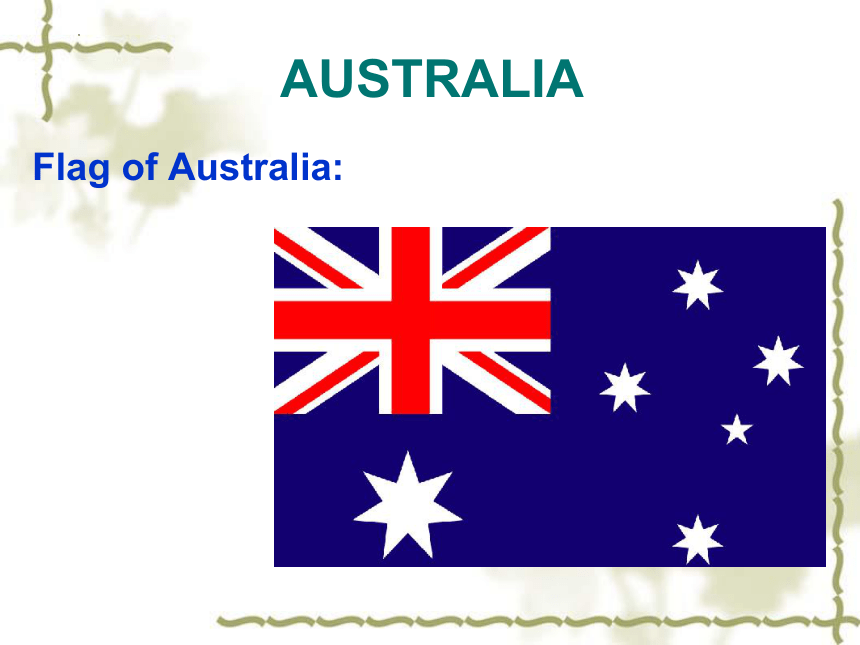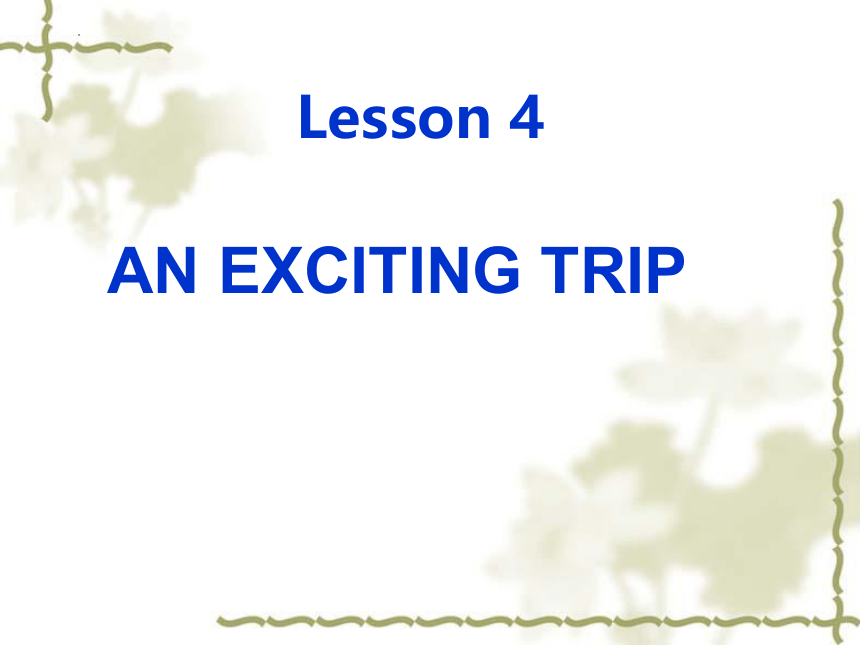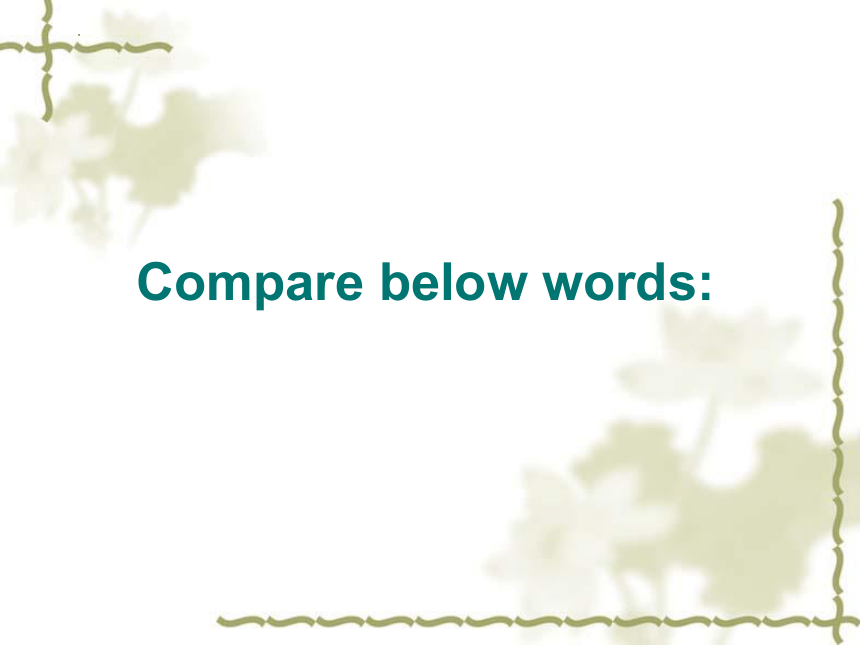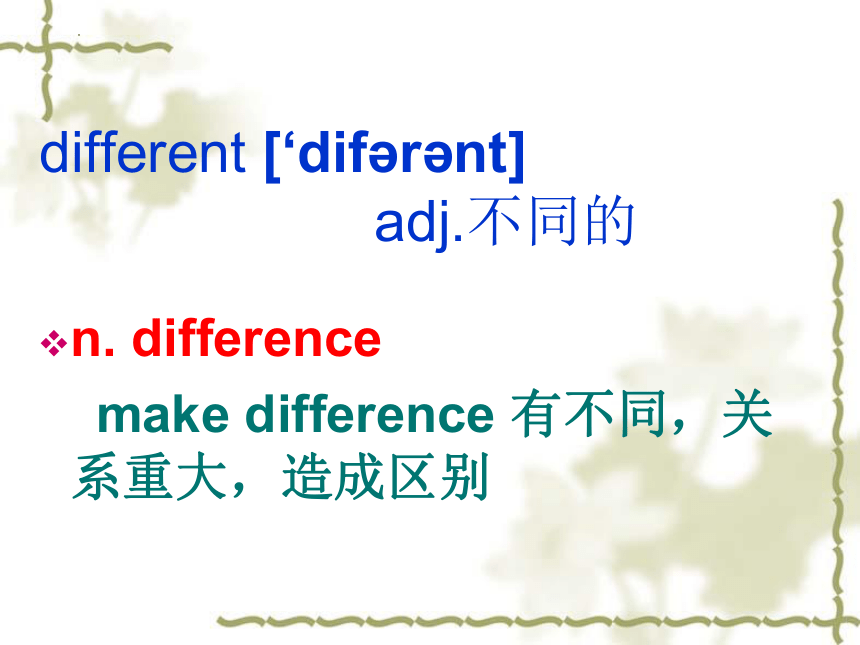2024-2025学年新概念英语第二册 Lesson 4 An exciting trip 课件(共48张PPT)
文档属性
| 名称 | 2024-2025学年新概念英语第二册 Lesson 4 An exciting trip 课件(共48张PPT) |  | |
| 格式 | pptx | ||
| 文件大小 | 248.4KB | ||
| 资源类型 | 教案 | ||
| 版本资源 | 新概念英语 | ||
| 科目 | 英语 | ||
| 更新时间 | 2024-08-25 11:51:20 | ||
图片预览












文档简介
(共48张PPT)
AUSTRALIA
Flag of Australia:
Lesson 4
AN EXCITING TRIP
exciting [ik‘saiti ] adj. 令人兴奋的
WORDS AND EXPRESSIONS
excited adj.(感到)兴奋的
The _________moment came as expected.
She’s very ________about getting the opportunity for the competition.
The ________ children were opening their Christmas presents.
exciting
excited
excited
Compare below words:
interesting; interested
disappointing; disappointed
有趣的;
感到有趣的
感到失望的
令人失望的
总结:同时具有-ed和-ing形容词,-ed通常形容人,表示“感到…的”;而-ing的形容词则形容物,表示“使人…的;令人…的”
receive /ri`si:v/ v. 接受,收到
同义词: accept v.接受,收到
receive表示单纯“收到”的概念,accept表示“收到并且接受了”
I __________an invitation from her and I __________it.
received
accepted
firm [f :m] n.商行,公司
= company
adj.稳固的,牢固的,坚定的
We must stand firm in the face of difficulty.
different [‘dif r nt]
adj.不同的
n. difference
make difference 有不同,关系重大,造成区别
例句:
It makes no difference whether you come or not.
Center n. 中心
There is a museum in the center of the city.
abroad adv. 在国外
go abroad
travel abroad
study abroad
live abroad
LANGUAGE POINT
He is working for a big firm and he has already visited a great number of different places in Australia.
1.work for: 为…工作;在…工作
My father is working for the bank.
2. a great number of 许多
= a great many of +可数名词
a great amount of+不可数名词
He has just bought an Australian car and has gone to Alice Springs, a small town in the centre of Australia.
“a small town in the centre of Australia”是Alice Springs的同位语。
*同位语位于名词或代词的后面,说明他们的性质和情况。同位语可以说是一种定语。用于修饰和限定前面的名词或代词。
My brother has never been abroad before, so he is finding this trip very exciting.
(1)区别:
have(has) been to
have(has) gone to
*have(has)been用来表示以往的经历,译为“来(到)过”,常与频度副词once, ever等连用。
Have you ever been there
They’ve been to Beijing Twice.
have(has) gone表示“走了”“到…去了”,一般不与第一、二人称连用。
He has gone to Shanghai.(可能在途中,也可能已到上海,但不在这里)
2. finding this trip very exciting
find+宾语+宾语补足语(find+名/代+形容词)
I found this film very touching.
Do you find this book interesting
英语中有些及物动词,除有一个直接宾语以外,还要有一个宾语补足语,才能使句子的意义完整。
这些常用的及物动词有:
make(使)
consider(认为)
find(发现)
have(让,使得)
let(让)
think(认为)等
What he said make me very angry.
We consider/think the answer correct.
He has his leg broken.
trip 旅行。表示“去…旅行”:
take a trip to…
I want to take a trip to Germany this summer vacation.
现在完成时
现在完成时
现在完成时由助动词have(has)+过去分词构成。
Has用于第三人称,have用于其他各种人称。
(1)表示从过去某时开始一直延续到现在的动作和状态。
常与表示时间段的状语连用,如for ten minutes, since 1985, all day等,也可以带表示到目前为止的时间状语,如so far, up to now, until now.
I have sat for hours in the classroom, reading a novel.
The weather has been cold so far this winter.
---How long have you been here
---I’ve been here for an hour.
(2)表示过去发生的某一动作对现在造成的影响或结果。
常带不确定的时间状语,如already, yet, once, twice, just, ever, never等。
Have you ever considered moving to the south
They have just joined our computer to the Internet.
注意:
非延续性动词不能表示 “动作延续至今”,因此不能与for, since 等延续性的时间状语连用。
He has arrived here for two hours.
He has been here for two hours.
判读正误:
(错)
(正)
We have bought a car for a week.
We have had a car for a week.
(错)
(正)
但用于否定式时,此类动词却不受这一限制,可以与for,since等延续性时间状语连用,因为动作在一段时间内不发生是可能的。
Haven’t seen you for a long time!
We haven’t heard from her since last week.
用于完成时态的时间状语
与表示一段时间的状语连用,如"for+时间段","since+时间点"。
如:
We have lived in this city for more than 40 years.
我们在这个城市已生活了40多年。
We have lived in this city since 1958.
我们从1958年起就住在这个城市里。
改写以下句子
I have had breakfast. (just)
___________________________
He has been in prison. (for six months)
____________________________
I have just had breakfast.
He has been in prison for six months.
The police has not caught the thief. (yet)
___________________________
You have asked that question three times. (already)
____________________________
The police has not caught the thief yet.
You have already asked that question three times.
Have you been to Switzerland (ever)
_____________________________
I have been to Switzerland. (never)
____________________________
Have you ever been to Switzerland
I have never been to Switzerland.
He is a wonderful runner. He has broken two records. (so far)
_____________________________
I haven’t seen George. (lately)
____________________________
…He has broken two records so far.
I haven’t seen George lately.
AUSTRALIA
Flag of Australia:
Lesson 4
AN EXCITING TRIP
exciting [ik‘saiti ] adj. 令人兴奋的
WORDS AND EXPRESSIONS
excited adj.(感到)兴奋的
The _________moment came as expected.
She’s very ________about getting the opportunity for the competition.
The ________ children were opening their Christmas presents.
exciting
excited
excited
Compare below words:
interesting; interested
disappointing; disappointed
有趣的;
感到有趣的
感到失望的
令人失望的
总结:同时具有-ed和-ing形容词,-ed通常形容人,表示“感到…的”;而-ing的形容词则形容物,表示“使人…的;令人…的”
receive /ri`si:v/ v. 接受,收到
同义词: accept v.接受,收到
receive表示单纯“收到”的概念,accept表示“收到并且接受了”
I __________an invitation from her and I __________it.
received
accepted
firm [f :m] n.商行,公司
= company
adj.稳固的,牢固的,坚定的
We must stand firm in the face of difficulty.
different [‘dif r nt]
adj.不同的
n. difference
make difference 有不同,关系重大,造成区别
例句:
It makes no difference whether you come or not.
Center n. 中心
There is a museum in the center of the city.
abroad adv. 在国外
go abroad
travel abroad
study abroad
live abroad
LANGUAGE POINT
He is working for a big firm and he has already visited a great number of different places in Australia.
1.work for: 为…工作;在…工作
My father is working for the bank.
2. a great number of 许多
= a great many of +可数名词
a great amount of+不可数名词
He has just bought an Australian car and has gone to Alice Springs, a small town in the centre of Australia.
“a small town in the centre of Australia”是Alice Springs的同位语。
*同位语位于名词或代词的后面,说明他们的性质和情况。同位语可以说是一种定语。用于修饰和限定前面的名词或代词。
My brother has never been abroad before, so he is finding this trip very exciting.
(1)区别:
have(has) been to
have(has) gone to
*have(has)been用来表示以往的经历,译为“来(到)过”,常与频度副词once, ever等连用。
Have you ever been there
They’ve been to Beijing Twice.
have(has) gone表示“走了”“到…去了”,一般不与第一、二人称连用。
He has gone to Shanghai.(可能在途中,也可能已到上海,但不在这里)
2. finding this trip very exciting
find+宾语+宾语补足语(find+名/代+形容词)
I found this film very touching.
Do you find this book interesting
英语中有些及物动词,除有一个直接宾语以外,还要有一个宾语补足语,才能使句子的意义完整。
这些常用的及物动词有:
make(使)
consider(认为)
find(发现)
have(让,使得)
let(让)
think(认为)等
What he said make me very angry.
We consider/think the answer correct.
He has his leg broken.
trip 旅行。表示“去…旅行”:
take a trip to…
I want to take a trip to Germany this summer vacation.
现在完成时
现在完成时
现在完成时由助动词have(has)+过去分词构成。
Has用于第三人称,have用于其他各种人称。
(1)表示从过去某时开始一直延续到现在的动作和状态。
常与表示时间段的状语连用,如for ten minutes, since 1985, all day等,也可以带表示到目前为止的时间状语,如so far, up to now, until now.
I have sat for hours in the classroom, reading a novel.
The weather has been cold so far this winter.
---How long have you been here
---I’ve been here for an hour.
(2)表示过去发生的某一动作对现在造成的影响或结果。
常带不确定的时间状语,如already, yet, once, twice, just, ever, never等。
Have you ever considered moving to the south
They have just joined our computer to the Internet.
注意:
非延续性动词不能表示 “动作延续至今”,因此不能与for, since 等延续性的时间状语连用。
He has arrived here for two hours.
He has been here for two hours.
判读正误:
(错)
(正)
We have bought a car for a week.
We have had a car for a week.
(错)
(正)
但用于否定式时,此类动词却不受这一限制,可以与for,since等延续性时间状语连用,因为动作在一段时间内不发生是可能的。
Haven’t seen you for a long time!
We haven’t heard from her since last week.
用于完成时态的时间状语
与表示一段时间的状语连用,如"for+时间段","since+时间点"。
如:
We have lived in this city for more than 40 years.
我们在这个城市已生活了40多年。
We have lived in this city since 1958.
我们从1958年起就住在这个城市里。
改写以下句子
I have had breakfast. (just)
___________________________
He has been in prison. (for six months)
____________________________
I have just had breakfast.
He has been in prison for six months.
The police has not caught the thief. (yet)
___________________________
You have asked that question three times. (already)
____________________________
The police has not caught the thief yet.
You have already asked that question three times.
Have you been to Switzerland (ever)
_____________________________
I have been to Switzerland. (never)
____________________________
Have you ever been to Switzerland
I have never been to Switzerland.
He is a wonderful runner. He has broken two records. (so far)
_____________________________
I haven’t seen George. (lately)
____________________________
…He has broken two records so far.
I haven’t seen George lately.
同课章节目录
